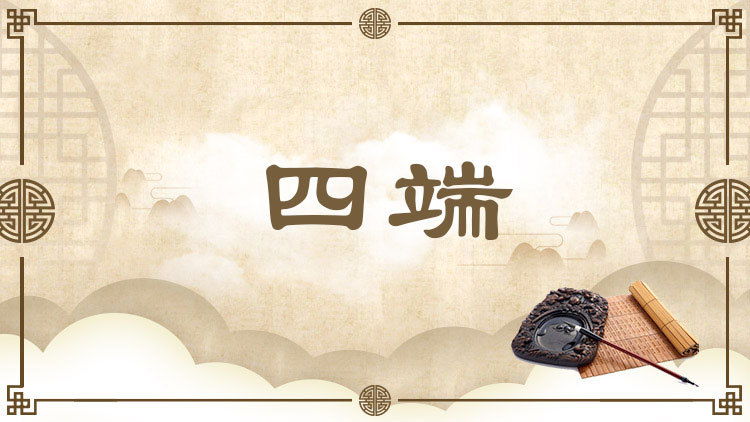四端 Four Initiators

仁、义、礼、智四德的端始、萌芽。孟子认为仁、义、礼、智根于心。恻隐之心是仁之端,羞恶之心是义之端,辞让之心是礼之端,是非之心是智之端。“四端”是每一个人天生所具有的,是人之所以为人的本质特征。人只要充分扩充、发挥自己内心所固有的善端,就能够成就仁、义、礼、智四德,从而成为君子乃至圣人。
The four initiators are buds of four virtues: ren (仁), yi (义), li (礼), and zhi (智), or roughly benevolence, righteousness, propriety, and wisdom, which Mencius believed were all rooted in man's mind. Commiseration is the initiator of benevolence. Shame is the initiator of righteousness. Deference is the initiator of propriety and a sense of right and wrong is the initiator of wisdom. The four initiators are naturally possessed by man. They are fundamental features defining a human being. Man should fully cultivate and develop his inherent kindness. Then he can accomplish the four virtues, and consequently become a man of virtue or even a sage.
引例 Citation:
◎凡有四端于我者,知皆扩而充之矣,若火之始然,泉之始达。苟能充之,足以保四海;苟不充之,不足以事父母。(《孟子·公孙丑上》)
凡是具有“四端”的人,知道把它们扩充起来,就好像火刚开始燃烧,泉水刚开始涌出。如果能够扩充“四端”,就足以安定天下;如果不能扩充“四端”,都不足以奉养父母。
All who have the four initiators in them should know how to cultivate them, so that these initiators will grow, just like a fire that has started burning, or a spring that has started gushing out. If people can cultivate and expand the four initiators, they can bring stability to the world. Otherwise, they can hardly provide for their parents. (Mencius)
推荐:教育部 国家语委
供稿:北京外国语大学 外语教学与研究出版社
责任编辑:钱耐安





